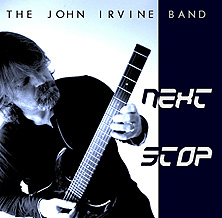 The
concept of jazz-rock fusion is not exactly a new idea, yet new and
exciting musicians keep stepping up to the challenges of bringing
the genre just that much further. Case in point is Next Stop,
the 2013 CD by The John Irvine Band. This excellent nine
track Next Stop CD somehow went under the radar yet, thanks
to astute listeners who continue to sing its praises the Next Stop
CD finally found its way for review into the trusty mwe3 CD player.
Some in the know music fans have cited the late 1970s music of Alan
Holdsworth as being similar in style to the sound of Next Stop.
That may be true, yet on Next Stop, the Scotland-based John
Irvine just about revolutionizes the entire jazz-rock instrumental
concept and overall, Next Stop makes for a most electrifying
hour of music listening. Not only are Irvine’s guitar skills
first rate but his mastery of the melodic ideas involved in creating
memorable instrumental music makes Next Stop one of the most
vital instrumental fusion albums of the millennium. A most successful
follow up to Irvine’s 2011 CD Wait & See, on 2013’s
Next Stop, Irvine settles deeply into a vast sonic landscape
while receiving fantastic support from his JIB rhythm section—Alan
Emslie (drums, percussion and co-production) and Doug Kemp
(bass). Fusion fans looking for new and intelligently written
and recorded instrumental jazz-rock fusion will do the right thing
by picking up on the CD release of Next Stop, by the John Irvine
Band.
The
concept of jazz-rock fusion is not exactly a new idea, yet new and
exciting musicians keep stepping up to the challenges of bringing
the genre just that much further. Case in point is Next Stop,
the 2013 CD by The John Irvine Band. This excellent nine
track Next Stop CD somehow went under the radar yet, thanks
to astute listeners who continue to sing its praises the Next Stop
CD finally found its way for review into the trusty mwe3 CD player.
Some in the know music fans have cited the late 1970s music of Alan
Holdsworth as being similar in style to the sound of Next Stop.
That may be true, yet on Next Stop, the Scotland-based John
Irvine just about revolutionizes the entire jazz-rock instrumental
concept and overall, Next Stop makes for a most electrifying
hour of music listening. Not only are Irvine’s guitar skills
first rate but his mastery of the melodic ideas involved in creating
memorable instrumental music makes Next Stop one of the most
vital instrumental fusion albums of the millennium. A most successful
follow up to Irvine’s 2011 CD Wait & See, on 2013’s
Next Stop, Irvine settles deeply into a vast sonic landscape
while receiving fantastic support from his JIB rhythm section—Alan
Emslie (drums, percussion and co-production) and Doug Kemp
(bass). Fusion fans looking for new and intelligently written
and recorded instrumental jazz-rock fusion will do the right thing
by picking up on the CD release of Next Stop, by the John Irvine
Band.
mwe3 presents an interview with
JOHN IRVINE
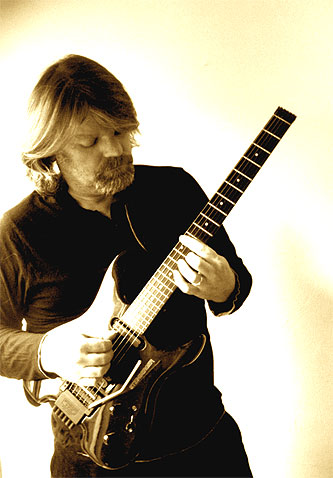 mwe3: I
was kind of kicking myself for not hearing the Next Stop CD
last year. It’s that good. When did you write and record Next
Stop and how would you compare it with you earlier album Wait
& See?
mwe3: I
was kind of kicking myself for not hearing the Next Stop CD
last year. It’s that good. When did you write and record Next
Stop and how would you compare it with you earlier album Wait
& See?
John Irvine: Well, thanks Robert for the kind comments.
It's great to know that the album is finding the kind of people I
intended it for. And to answer the first part of your question, I
composed the majority of the material for Next Stop in the
two years following Wait & See. It takes me a long to time
to get an album's worth of music together. My home studio set-up had
changed between albums and I had some problems with gear, but those
were resolved over time and the main work was done from February to
June 2013. The final mixing and mastering was done at Castlesound
Studios in Pencaitland, outside Edinburgh - the same place as where
Wait & See was done.
Stuart Hamilton was the engineer on both albums. He really transformed
the material into what it is, sound-wise. In comparison with the first
album, I think Next Stop marks a real development. I think
the compositions are more complex, a bit more interesting than the
material on the first album, certainly the keyboards and background
layerings are richer, more intricate. And both the jazz element and
the progressive element are more prominent on this one, they've both
been brought out a bit more.
mwe3: It seems like you’ve hit a veritable sweet spot on Next
Stop, is that a fair statement? What was your sonic mission this
time?
John Irvine: Yes, I think Next Stop is the better album,
overall. But if I were to be overly self-critical then I would say
that there are things that I like more on the first CD. The playing
on Wait & See is a bit tighter, in my view. With the last
album I let a bit of the production side of things slip, because of
time constraints and the fact that it was a bigger project, as a result
there are several things that could have been done better. It reminds
of an interview I read a long time ago with Yes drummer Alan White,
where he'd criticized Trevor Rabin for going through the whole of
their Talk album and moving all the drum audio so it was perfectly
in time. Well, that was my approach on Wait & See, and
it shows. Next Stop has more of a 'live' feel, but lots of
people seem to like that, so it's all good.
mwe3: You’re pictured on the cover of Next Stop playing
a kind of Steinberger (headless) looking guitar. Is that the same
red guitar pictured on Wait & See as well?
John Irvine: The guitar on the cover of Wait & See
is a Hohner headless guitar called 'The Jack' made in the 1990s -
a Steinberger copy, very similar to the current G3T but with a Strat
body. Very well made - and having played a good variety of Steinbergers
over the years, a very versatile guitar. The guitar on the Next
Stop cover is a Steinberger GR4 headless, correct.
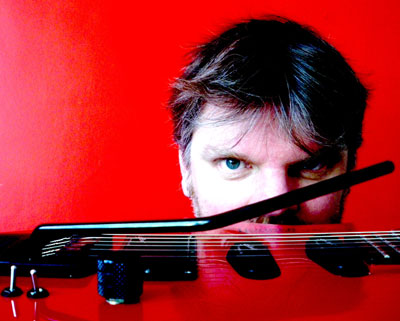 mwe3:
How has your choice of guitars changed and evolved over the years
and what guitars are you playing on your albums? Do you also play
acoustic guitars?
mwe3:
How has your choice of guitars changed and evolved over the years
and what guitars are you playing on your albums? Do you also play
acoustic guitars?
John Irvine: My main guitar at the moment is an ESP Edwards
SG 100LT2. I'm a big fan of Edwards guitars, Japanese made, great
design and craftsmanship. My SG is an amazing guitar. It has the lowest
action of any guitar I've ever played. That is the number one thing
for me - low action. I work and work on a guitar until the action
is virtually not there, and if a guitar doesn't come up to scratch,
then it has to be moved on. The guitars used on the albums varied
a great deal. I used a Hohner SE35 semi-acoustic, a Gibson Rd Standard,
a Godin Solidac, the Hohner Headless, the Steinberger GR4 and a Hohner
HR1000 Super-Strat. As far as amps go, it was an ENGL Screamer Combo
and an ENGL Thunder Head through a 4x12 ENGL cab. Effects used were
the Yamaha DG and UD Stomp boxes. As yet there have been no acoustic
guitars on either of my two albums. This will change on the next one.
I'm not a steel-string player… I find them very difficult to
play, but there will definitely be some classical guitar on the next
one.
mwe3: Tell us what keyboards you’re playing on the CD and
how the keys mesh with the guitar sounds?
John Irvine: I use MOTU's Digital Performer in my home studio.
It's a program I've used for about 25 years now, and all the keyboard
sounds are virtual instruments from their 'MX4' program. Most of the
keyboards are secondary in importance to the main guitar parts, but
I wanted to fill out the sound a bit more on this album.
mwe3: Can you tell us something about where you’re from, where
you grew up and where you live now as well as how you became interested
in the guitar and how that interest led to you becoming a recording
artist?
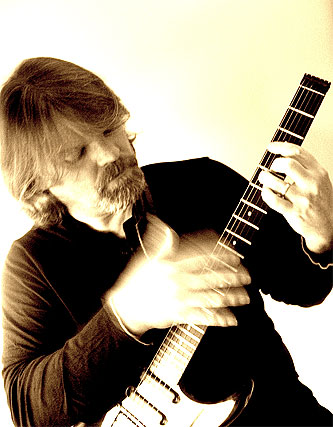 John
Irvine: I was born in Bristol, England in 1965, but my family
moved to the USA when I was 1 year old, and then on to Canada shortly
thereafter. We also spent a year in Zimbabwe before coming back to
the UK in 1979. I started the guitar that year and took classical
guitar lessons in Plymouth for a few years. Though I'd started music
late, I made good progress early on - enough to then go to Dartington
College of Arts to do A-Level music and, following that, The Royal
Scottish Academy of Music & Drama in Glasgow where I got my BA
and studied with Philip Thorne. This takes me up to 1992 when I began
a Ph.D. in Composition at the University of Edinburgh with the composer
Nigel Osborne as my supervisor. I completed that in 1999. So, you
can see that a lot of my formal education has been in classical music.
But I'm getting ahead of myself...
John
Irvine: I was born in Bristol, England in 1965, but my family
moved to the USA when I was 1 year old, and then on to Canada shortly
thereafter. We also spent a year in Zimbabwe before coming back to
the UK in 1979. I started the guitar that year and took classical
guitar lessons in Plymouth for a few years. Though I'd started music
late, I made good progress early on - enough to then go to Dartington
College of Arts to do A-Level music and, following that, The Royal
Scottish Academy of Music & Drama in Glasgow where I got my BA
and studied with Philip Thorne. This takes me up to 1992 when I began
a Ph.D. in Composition at the University of Edinburgh with the composer
Nigel Osborne as my supervisor. I completed that in 1999. So, you
can see that a lot of my formal education has been in classical music.
But I'm getting ahead of myself...
Growing up in Southern Ontario as a teenager you couldn't help but
be influenced by what 1970s FM radio was playing at the time: Steely
Dan, Chicago, Doobie Brothers, Earth, Wind & Fire, Stevie Wonder
etc. and by the local rock bands on the Toronto scene: Rush, FM, Max
Webster, Goddo and Triumph. We were also listening to the major hard
rock bands of the 70s: Kiss, Aerosmith, Queen, B.O.C., Cheap Trick,
Ted Nugent, Angel and so forth. Now, a lot of that music is very sophisticated,
but a friend of mine in 10th Grade told me to go away and listen to
Relayer by Yes, to 'hear what real music was like'. I knew
“Roundabout” from the radio, but hearing “The Gates
Of Delirium” for the first time was a whole new listening experience.
It was all I played for about a month, and soon, Genesis, Gentle Giant
and King Crimson followed.
We then moved to England. I was lucky that the public library in Plymouth
had a great vinyl selection. I would take out anything that looked
remotely interesting to me. So, I borrowed Stockhausen, The Manhattan
Transfer, a whole bunch of ECM stuff, Bill Dixon, Ornette Coleman
- it was a treasure trove. Most importantly though, was that I went
to Dartington College of Arts, Devon upon leaving school at 18 years
old. This was a somewhat radical, left-leaning, arts establishment
where I was lucky to be taught by the composer Frank Denyer, study
with the jazz guitarist John Etheridge and attend concerts by Evan
Parker, Keith Rowe, Keith Tippett, Yoshikazu Iwamoto and Armanath
Mishra, amongst others. I also saw Segovia play in the Great Hall,
but he was already in his 90s at this point. Needless to say, this
was the best education I ever had.
mwe3: Who were some of your favorite bands and musicians growing
up? What era of music did you grow up in?
John Irvine: Obviously, my early teens listening is tuned to
the 70s progressive and hard rock bands mentioned above, but when
we moved to the UK in '79 I became very interested in post-punk and
new wave. It was very different to the North American zeitgeist -
The Police, The Fixx, The Clash, Killing Joke, Siouxsie & The
Banshees, XTC, U2 - all really inventive stuff, and 'progressive'
in its own way. Of course, a lot of that would find its way over to
the Canada/U.S.A. soon enough, but culturally punk/new wave wasn't
nearly so influential as it was here in the UK. It motivated listeners
politically, socially and provided an alternative conscience to the
mainstream. This was very appealing because progressive rock had blown
itself out of the water by this time, so this plugged the gap left
by those progressive bands. And, I was getting into Frank Zappa...
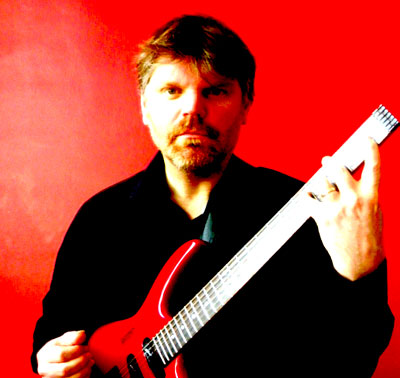 mwe3:
Track four “Your Skyline” is a tribute to the late great
John Martyn. Even though John Martyn was primarily a folk-jazz singer
he must have had a big impact on you. Tell us about John Martyn and
how other musicians had an impact on you.
mwe3:
Track four “Your Skyline” is a tribute to the late great
John Martyn. Even though John Martyn was primarily a folk-jazz singer
he must have had a big impact on you. Tell us about John Martyn and
how other musicians had an impact on you.
John Irvine: John Martyn was another big influence in my early
20s. I'd seen him live with his band in Plymouth in 1983 and a couple
of times since then in Glasgow. His One World, Glorious Fool and
Grace & Danger albums I regard as being his best work, and
right up there with Joni Mitchell's Court & Spark, Hissing
Of Summer Lawns and Hejira as the pinnacle of the guitar-based,
singer-songwriter genre. I must also say that I regard the Michael
Hedges album Watching My Life Go By in that category. But just
thinking about these three guitarists and how they approach the instrument
harmonically, it's interesting to note that all three used alternate
tunings. Now, that's not something I go in for, but their chordal
usage is certainly one that I am very keen on - particularly the Hedges
vocabulary.
So, certainly it was a sound that I was looking for - but in standard
tuning. You can see where I'm coming from. And if you take into account
the Metheny things, the Holdsworth things, add in some extended chord
voicings and classical fingerstyle then you have my harmonic goals
pretty well mapped out. I should mention that around this time I got
heavily into the West Coast/AOR scene: Christopher Cross, Michael
McDonald, Ambrosia, Al Jarreau, Toto and, of course, this music has
many great, great players like Jay Graydon, Steve Gadd, Larry Carlton
etc. who are all well-versed in jazz and rock styles. That
music stills holds great appeal for me. It has amazing moments of
jazz-influenced harmony, for example a track like “Generalities”
by Marc Jordan. Genius.
 mwe3:
Do you find your music being influenced by other art forms like
movies, paintings, other musical genres as well?
mwe3:
Do you find your music being influenced by other art forms like
movies, paintings, other musical genres as well?
John Irvine: I find my jazz music is not influenced by other art-forms
to any great extent. However, my classical music is. I've written
two multidiscipline works concerning Outsider Artists. The first being
a musical drama about Laure Pigeon (a French mediumistic artist),
and the second, a Percussion Quartet about Kea Tawana (The Ark) and
Ferdinand Cheval (Le Palais Ideal). I've also got a symphonic piece
about Hopi culture, a piano duet on Defoe's Robinson Crusoe
and so on. Learning about painting, and art in general, critical theory,
philosophy etc. I saw as being integral to my Ph.D. studies. I did
a lot of reading back then. I had lofty ideas that the polymath model
was the way forward, and if I'm honest, I still believe this to be
the case.
mwe3: One writer wrote that Next Stop is the best album
Allan Holdsworth never made. (or something to that effect) It sounds
to me though, like you take Holdsworth’s sound and make it even
more melodic from a rock perspective. Is that a fair assessment?
John Irvine: Holdsworth is a big influence, yes. But, as I've
said in other interviews, not in terms of his soloing. It's a pointless
exercise even bothering to cop licks off him. His solo ideas
work with his chordal context, and there it ends. And anyway,
he is so technically unapproachable to most mortals like myself that
imitation is not even an option. I think because my album covers have
headless guitars on them, and I mention him as an influence in press
material, a lot of people have commented on the perceived similarities.
So it's largely my fault. I personally think my music doesn't resemble
Holdsworth’s at all. It is much more rock-based and Metheny-esque
than Holdsworthian. Having said that, the above quote is still my
favorite!
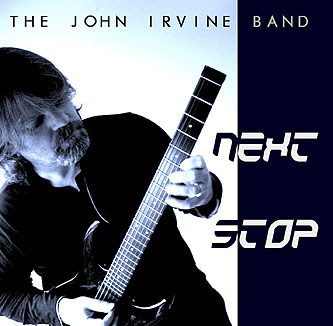 mwe3:
What guitarists today do you feel are breaking new ground for the
instrumental rock fusion genre?
mwe3:
What guitarists today do you feel are breaking new ground for the
instrumental rock fusion genre?
John Irvine: As far as newer jazz guitarists go, I like Tim Miller
and Steve Topping… he's not new, but he only recently recorded
his two solo albums, though I don't hear a lot of stuff that excites
me as much as the older albums by the greats. You see, people like
Metheny, Holdsworth - these guys are great composers, and the difference
between them and the you-tube speed merchants is just that - the compositions.
I mean, wouldn't you rather listen to Metheny's “The First Circle”
or “Minuano (Six-Eight)” than a sweep-picking, neo-classical
nightmare? Wouldn't you rather hear a piece like Holdworth's “Sphere
Of Innocence” over any shredding-type music you care to mention?
There is no contest, in my opinion. But bigger, stronger, faster,
louder seems to win more and more in our culture, doesn't it? A shame
that.
mwe3: Any favorite current artists that you’re listening to
these days?
John Irvine: As far as current jazz musicians go, I like
the saxophonist David Binney a lot, and I also find myself turning
to some of the fusion that I missed out on first time around: Oregon,
Codona, Brand X etc... I get a kick out of finding new things I've
missed in the past. You used to be such a victim of what your local
record store would stock, but that's all changed now. The internet
is a great source of discovery in that way.
With rock bands, I'm very into noise and math rock: Rob Crow, Amusement
Parks On Fire, Buildings, Ladder Devils, Cellos, Kowloon Walled City,
Dope Body, Polvo, Pissed Jeans, Roomrunner - this kind of stuff. It's
where it's at as far as inventiveness is concerned, at the moment.
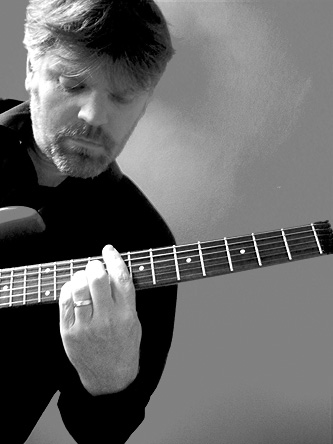 mwe3:
Do you enjoy playing live in concert? Tell us about what your live
shows are like?
mwe3:
Do you enjoy playing live in concert? Tell us about what your live
shows are like?
John Irvine: Oddly, no, I don't enjoy live performance. I've always
thought of performing as a form of damage limitation rather than the
ultimate form of self-expression. It can never be the same as a great
recorded, edited musical experience, and I don't need the roar of
the crowd or the smell of the greasepaint to get me going. But on
that note, I remember reading about Zappa being asked whether he preferred
working with the synclavier in the studio or working with his band.
He said: "I'm almost tempted to plump for the band." So
I'm very much in that vein, these albums are recording projects rather
than vehicles for performance. And the way live music is going at
the moment there is no way of doing it without making a loss financially.
Hiring musicians is expensive. They need to paid properly for their
time. It is enough that the albums can approach some semblance of
breaking even, without putting myself further into debt! (lol)
mwe3: What other activities are you involved with in Scotland,
including your classical music and TV/Film music and are you also
into the literary world too as I saw on your www.johnirvinewriter.com
web site.
John Irvine: As far as other activities go, my classical composition
is on hold for the moment. Similarly with TV, film and theater music.
My kids are still young and my son is a Type 1 Diabetic so I have
to prioritize my creative work carefully nowadays. But, yes, I have
two books out, and a lot of published poetry in various journals and
webzines. The novels are part of a nerdy, sc-if trilogy called The
Smith Chronicles and have been selling very well, to my surprise.
I'm finishing the final novel at the moment for late 2015 publication.
After that I will return to writing poetry for a bit and then I have
plans to start a new fantasy/historical book for children based on
the Scandinavian to Constantinople trade route during the Middle Ages.
I'm really looking forward to that.
 mwe3:
Even though Next Stop came out in 2013, it clearly deserves hearing
by guitar fans in 2015. So a year after Next Stop, have you been writing
new music and or planning new recordings?
mwe3:
Even though Next Stop came out in 2013, it clearly deserves hearing
by guitar fans in 2015. So a year after Next Stop, have you been writing
new music and or planning new recordings?
John Irvine: As far as another JIB album goes, I don't think that
will happen this year. I've simply haven't got the time. But the next
one will be very different to the previous albums, that is for sure.
Thanks
to John Irvine @ www.JohnIrvineMusic.com



